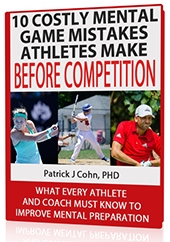
Introducing Sports Psychology to Young Athletes
Many sports parents want their kids to participate in a sport psychology coaching program.
At Peak Performance Sports, we help parents find out if their kids are good candidates for a mental training program and can benefit from it.
In this article, I’ll assume that your athletes are not performing as well as they can in competition due to mental errors, intimidation, tentative play, or indecision, which all indicate that your athletes can benefit from mental game coaching.
However, are they ready for it? We try to ascertain a young athlete’s commitment to a mental training program before we engage.
At what age are athletes ready to embrace mental training?
Are they ready and willing to commit to a program? We want all athletes and parent to understand that sports psychology coaching in not a quick fix—you talk to a mental game expert for an hour about the mental game and you are mentally tough.
Sports psychology training happens over months or a season, not just one week.
Athletes are taught mental skills—one at a time—to help them learn how to improve mental toughness.
First, if your athletes participate in other forms of performance improvement, such as functional training or fitness training outside or regular practice, they are more likely to commit to a sports psychology coaching program.
This shows their dedication to improvement in their physical game, which is a good sign.
Second, when a parent contacts us about a doing a sports psychology program with their athlete, we request to have a short 15-minute introductory meeting with each athlete. We can usually determine an athlete’s willingness and need to participate in a mental training program.
We want to find out:
- Does your athletes understand the role of the mental game?
- Does your athlete communicate an understanding of the challenges with his or her mental game?
- Does your athlete conclude that he or she would benefit from an improved mental game?
- Is your athlete being encouraged to do sports psychology training by others and is this the sole motivation for participation?
Yes, at Peak Performance Sports, we’ve had to turn down potential clients because we thought an athlete was not ready or willing to participate in mental training.
We think a better option is to not start a program instead of doing one session and having the athlete stop the program.
Sometimes, athletes are not aware of the need for mental training because they are not aware of the role of a solid mental game in their performance.
In other cases, athletes do not want to admit that they have a “problem” with their mindset or attitude. Some athletes think if they need help with the mental game, it’s a sign of weakness.
In our introductory 15-minute meeting with young athletes (via the phone or Skype usually), we’ll ask a series of questions about their mental game.
We can also introduce the topic to athletes so they understand how sports psychology can help them perform better and enjoy sports more.
We also want to show athletes that we understand their situation and have seen the same issues with others athletes. The first meeting helps us build rapport and get to know each other before you commit to a sports psychology coaching program.
Contact Sports Psychology Coach today to discuss is your young athlete is ready for mental training.
Related Sports Psychology Articles:
- Helping Kids Experience The Benefits of Youth Sports
- How Parents Can Help Sports Kids Stay Safe
- How Parents Can Help Kids Stay in Sports
Free Mental Toughness Reports

Get instant access to a mental game report to improve your mental toughness. Are you making one or more of these “deadly” mental game mistakes prior to competition? You can improve your mental game with one of our free sports-specific reports below.
with our free mental toughness reports, you’ll:
- Discover if you have positive or negative pregame jitters.
- Identify your pre-competition mental game mistakes.
- Learn the important pregame mental skills to boost your performance and success!
Learn how mental game strategies can boost your mental toughness in sports with Dr. Cohn’s free mental game reports!
Dr. Patrick Cohn is an expert mental performance coach who has helped athletes for over 30 years enhance their performance. Dr. Cohn earned a master’s degree in sports psychology from CSUF and a Ph.D. from the University of Virginia, specializing in Applied Sports Psychology.
